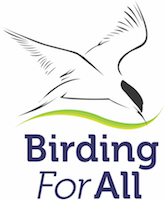GOB 27 – Birding For All
This article appeared in the January 2012 edition of Birdwatch
Birders beware! I am about to ride a hobbyhorse and shamelessly promote an initiative I took ten years ago that still needs to sink deeper into the consciousness of birding service providers everywhere.
You may be surprised to know that being fat and decrepit has a downside. These days I often have trouble waddling my way to watch birds and so, for over a decade I have been whining to whoever would listen. Winging about provision for people with mobility issues. Somehow my shallow self-interest expanded, encompassing anyone sharing my indolence, lack of self-discipline or medical vicissitudes.
Lucky for me a few of those who mattered listened and now many RSPB reserves have accessible hides for wheelchair users, even paths for the less sure-footed and many benches placed for us fat folk to wheeze between. Several of the haunts I regularly frequent let me drive to hides on my most arthritic days. My mate Brian of Essex is called upon to wheel along new reserve paths to sus out the ruts, or see if his aging arms retain sufficient strength to ‘push’ up a hide ramp (if he fails to trick passing people to push him).
Mike Clark has been coming over to our stand at the Bird Fair and asking ‘how are we doing’ and ‘what more can we do’ long before he was elevated to his present RSPB godhood. Other more local providers have also made great strides.
Efforts are being made to improve reserve provision, but by the standards set in Canada, the US, New Zealand or Australia there is a long way to go before disabled birders have impeccable provision. If ‘Birding For All’ was only about access to reserves then we would be working up to a smile… but there is more to birding than Minsmere or Loch Garten.
This month’s diatribe was set off by being asked for advice on setting up scopes for wheelchair users to look at some city Peregrines. What would suit different height wheelchairs and what equipment could they use? Trouble is keen birders who cannot walk or stand have to create their own equipment to scope, support binoculars or focus one-handed. I’ve seen no effort to improve such optical equal opportunities; in some ways its got worse! Even the support ‘cradle’ for binoculars – not unlike a one-man band harmonica support – is no longer made.
Brian has created a scope support using a bar between the sides of his wheelchair, a swivel and a hide clamp so he can cantilever his scope from between his legs up to his eye when a bird appears. It’s not ideal, wheelchairs and people are different shapes and sizes. Even Brian finds it only does 60% of the job. Moreover, he has a better idea that could work for all! There is no tripod that’s easy to use in a wheelchair. Given the high profit margin on optical kit – there are tens of millions of birders – surely it would be worth getting into this market. Many thousands of birders could benefit.
Using a scope in a hide is a close match – its hard to sit and use a scope in one, and hide clamps don’t always have anywhere to clamp too at the right height – overcoming that problem must be worth some investment; thereby accidentally benefitting wheelchair users. Instead millions of pounds gets spent on a tiny optical or fluid motion improvements that most users won’t even notice!
It’s not just birding equipment – I’ve been lambasting the authors of ‘where to watch’ guides for as long as I’ve been writing reviews yet most hardly tackle access at all (there are are honourable exceptions – notably Buckingham Press). They find out about cycle paths and bus stops, car parking and toilets yet completely fail to note whether hides have ramps, paths are solid or benches are provided – the single best feature for making reserves more friendly to the ‘hard of walking’. Its not just obese objectors like me who benefit from better information – the majority of us develop mobility issues over time, so enlightened self-interest should make more people wave this particular flag.
Hands up everyone hoping to go on birding well past retirement. Now hands up all those who want their kids to develop bird awareness. Hands up those who have ever been ill or had an accident. Thought so, that’s most of you – so don’t wait until you need better provision – start loud whining now!





